When it comes to creating content for your website, people aren’t looking for endless pages of text. They’re seeking clear, straightforward answers that solve their problems quickly and effectively. The ideal word count for SEO success isn’t about hitting a magic number; it’s about providing just the right amount of information to fully address what the searcher is looking for and guide them toward taking the next action, like contacting you or downloading a resource.
Think of your audience as busy individuals with limited time, your content as a direct roadmap to the results they want, and your page as something designed for easy skimming and practical use. For example, if a concise 900-word article delivers a complete solution with real evidence and examples, it will outperform a longer 2,500-word piece that’s padded with unnecessary details.
On the other hand, if the topic is more intricate and requires deeper explanation, skimping on details could mean fewer visitors sticking around, less sharing from others, and missed opportunities for leads or sales. As a beginner in SEO, remember that quality and relevance always trump quantity. Focus on making your content helpful and to the point.
Table of Contents
Analyze Intent Before You Draft
Before you even start writing, take a moment to really understand what your potential reader is trying to achieve. This is called “user intent,” and it’s the foundation of effective SEO content. By examining the current search engine results page (SERP) for your target keyword, you can see what types of pages Google is already promoting and how other websites are addressing the same query. Your aim isn’t to imitate them exactly but to meet the basic expectations they’ve set and then go a step further by offering clearer explanations, stronger evidence, or unique insights that make your page stand out. This step is crucial for beginners because it prevents you from writing aimlessly and ensures your content aligns with what people actually need.
- What job is the reader trying to get done? Ask yourself: Are they looking for quick tips, in-depth tutorials, product comparisons, or something else? This guides your focus.
- Skim the top results and list common subtopics. – Quickly review the first few pages in search results and note recurring sections, like “benefits,” “steps,” or “common mistakes,” to cover the essentials.
- Note media types that appear, such as lists, tables, and video. – Observe if top pages use bullet points, charts, or embedded videos, as these can make your content more engaging and easier to digest for beginners.
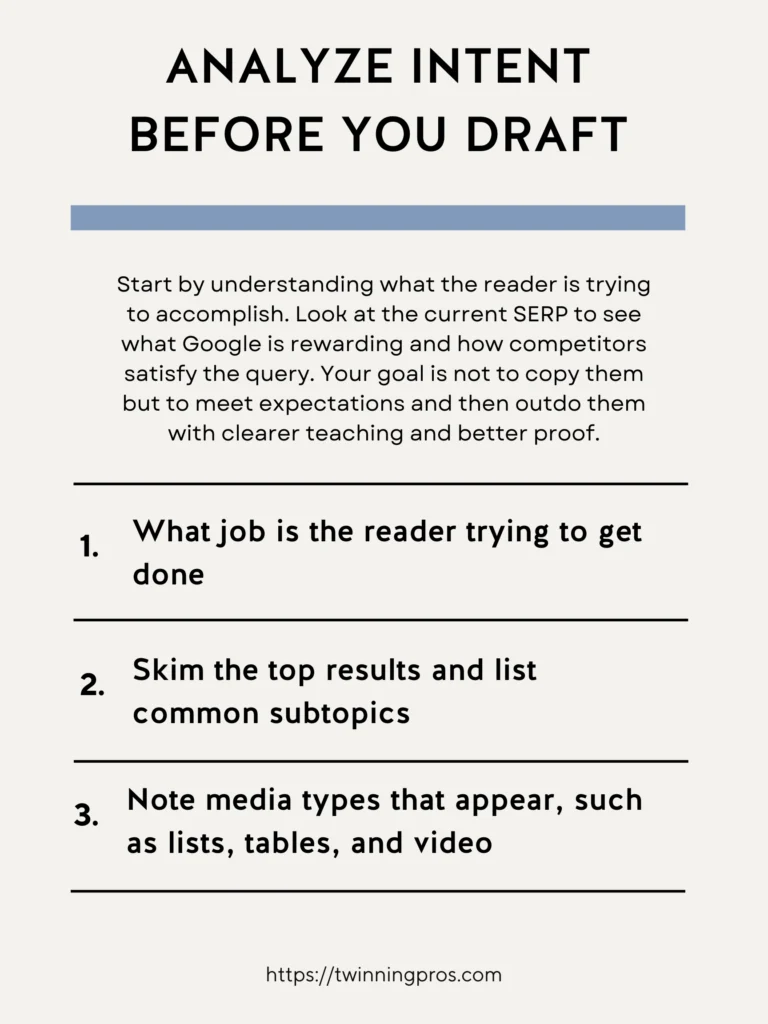
Map Questions To Sections
Once you’ve identified the key questions or needs from your intent analysis, organize your content by turning each one into a dedicated section. This creates a logical flow that helps readers find what they want without frustration. For SEO beginners, this structure acts like a table of contents built right into the page, allowing people to scan headings and jump to relevant parts quickly. It also keeps your writing focused, avoiding unnecessary tangents, and makes it simpler to update the page later if new information arises or trends change. Plus, this approach improves how search engines understand your content, potentially boosting your visibility.
- Turn each common question into an H2 or H3 – Use subheadings (like H2 for main sections and H3 for subsections) to directly address queries, such as “How Do I Start?” or “What Tools Do I Need?”
- Use bullets for steps and requirements – Break down processes into simple, bulleted lists to make instructions easy to follow, especially for those new to the topic.
- Add a summary or quick wins near the top – Include a short overview or list of immediate takeaways early on, so readers get value right away and decide to read further.
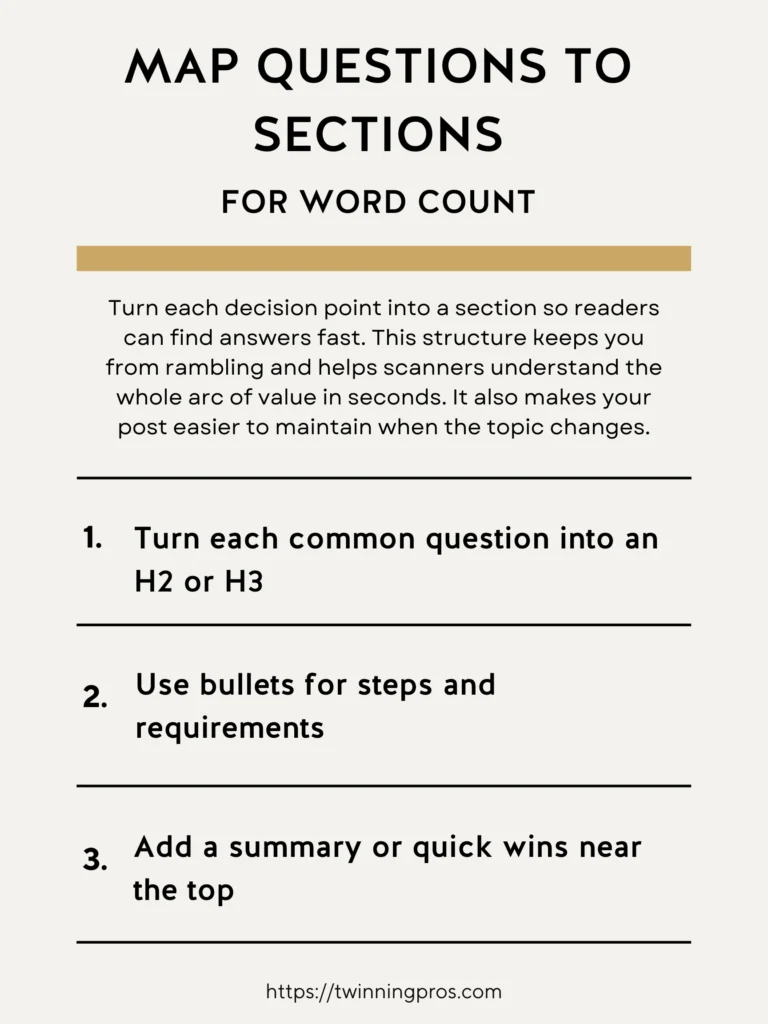
Cut Words That Do Not Sell Understanding
The real power in your content comes during the editing phase. This is where you refine your draft to make it sharper and more impactful. Focus on removing anything that doesn’t directly help the reader grasp the concept or move forward; this “selling understanding” means every sentence should contribute to clarity and value. For beginners, swap out fuzzy or general statements with concrete details, like exact numbers or relatable examples, to make your points stick. Opt for short sentences in active voice (where the subject does the action, like “You build the page” instead of “The page is built by you”) to keep the reading pace lively and make your knowledge seem accessible rather than intimidating or overly complex.
- Remove filler intros and repeated phrasing – Cut unnecessary openings like “In this article, we’ll discuss…” and eliminate any ideas that are said more than once.
- Replace vague claims with specifics, numbers, and examples – Instead of saying “It’s important,” say “This step saves 20% of your time, as shown in our example below.”
- Use active voice and short sentences – This keeps the text energetic and easy to read, helping beginners absorb information without getting bogged down.
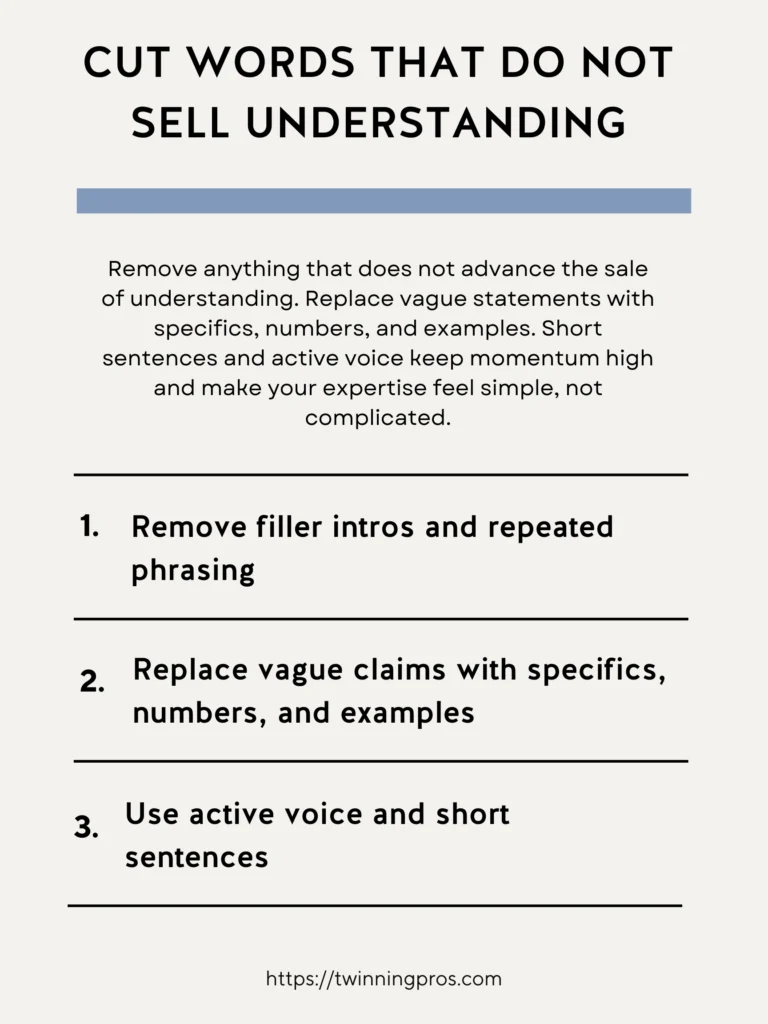
Use Competitive Gaps To Add Value
After you’ve covered the core topics that everyone else is addressing, look for opportunities where your competitors fall short. These “gaps” are your chance to provide extra value that sets your page apart and encourages shares, backlinks, or social mentions. As an SEO beginner, this might mean adding elements like your own custom visuals or tools that aren’t found elsewhere, turning your content into a go-to resource. Include a brief FAQ section to tackle those more specific, longer-tail questions (like detailed variations of the main query) that real people might have, addressing potential doubts and making your page even more comprehensive without overwhelming the main flow.
- Identify subtopics top results miss – Spot what’s lacking in other pages, such as advanced tips or beginner pitfalls, and fill those in.
- Add original examples, templates, and screenshots – Include your unique content, like downloadable templates or step-by-step images from your own work, to offer practical help.
- Include a short FAQ to capture long-tail questions – Answer 3-5 common follow-up queries at the end, helping with niche searches and building trust.
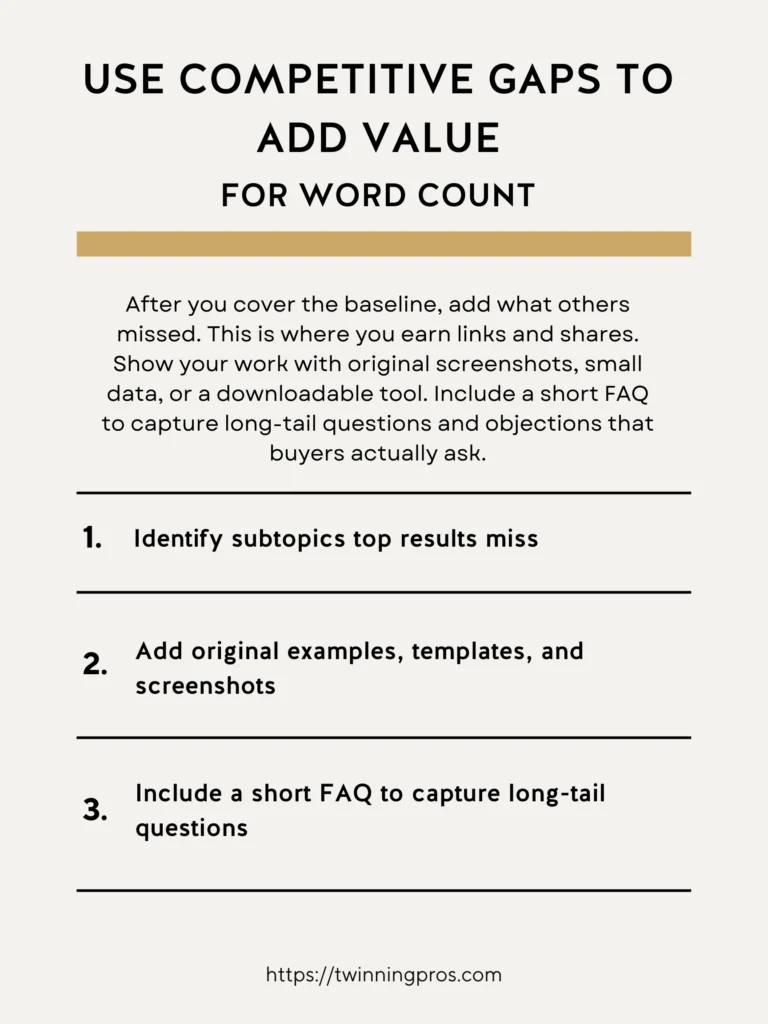
Quick Length Framework
These suggested word count ranges are just flexible guidelines to get you started. Ultimately, let the user’s intent and the need for thorough coverage determine how long your piece should be. If explaining the topic clearly requires more words, go ahead and expand; if you can deliver the same value more concisely without skimping on details, trim it down. For beginners, this framework helps avoid the trap of writing too little (missing key info) or too much (boring readers), ensuring your content feels balanced and purposeful.
- How-to or checklist: 800 to 1,200 words – Ideal for straightforward guides or lists that provide quick, actionable advice.
- Deep guide or pillar: 1,800 to 3,000 words – Suited for comprehensive topics that need in-depth exploration, like complete overviews or strategies.
- Local or service page: 600 to 1,000 words – Keeps it concise for pages focused on specific locations or offerings, while still covering essentials.
- Adjust to fully cover the topic and intent. – Always prioritize completeness over sticking rigidly to numbers.
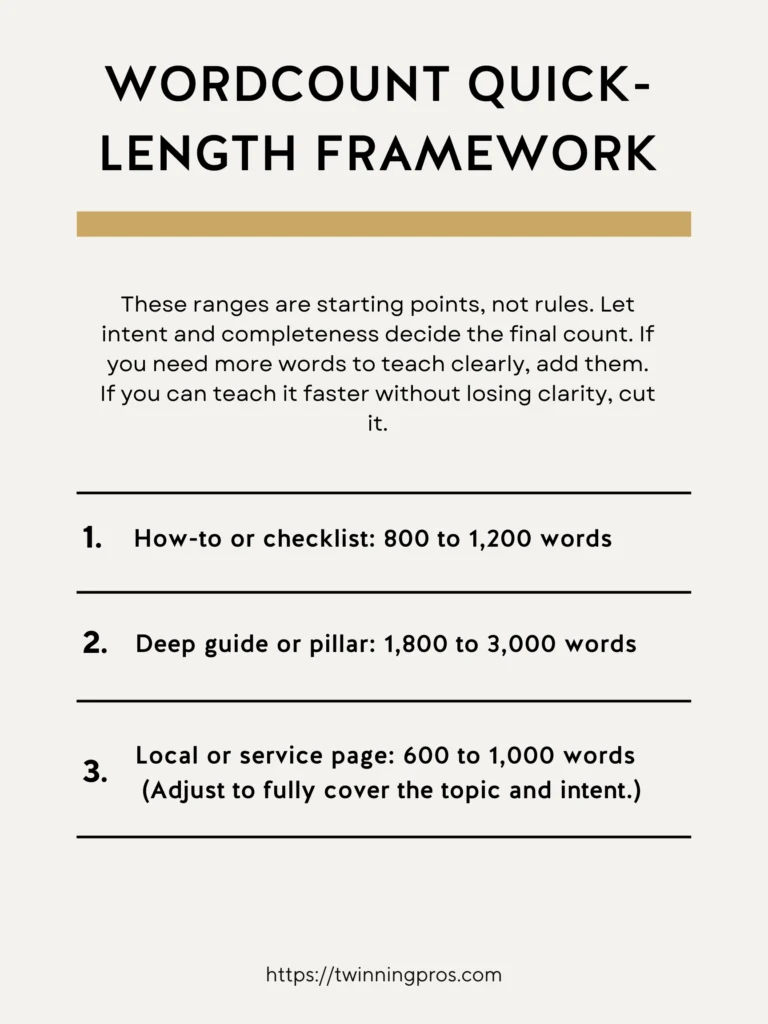
Final Thoughts
There is no magic length. There is only a complete answer. Size to intent, not to a number. Shorten where the reader already knows the setup. Expand where a step needs clarity, a visual, or proof. Your best pages feel inevitable because they say exactly what the searcher needs and nothing extra.
Working practice. Set a target range by intent. Draft the outline first. Write the shortest version that fully answers the question. Add only what improves understanding or action. Trim anything that repeats or delays the next step.
Next Steps
As you’ve seen throughout this beginner’s guide to SEO fundamentals, small, consistent tweaks can make a massive difference in how search engines and visitors perceive your site. But remember, true success comes from a holistic approach tailored to your unique business. If you’re ready to take your SEO to the next level, check out our professional SEO services, where we handle everything from keyword research to on-page optimization to help you rank higher and attract more customers.
No matter where you are on your SEO journey, whether you’re just starting or already seeing some traction, it’s essential to have your website professionally audited at least twice a year to uncover hidden issues and keep things running smoothly; our comprehensive SEO Audit dives deep into your site’s performance, providing actionable insights without the overwhelm.
And if you want to build these skills yourself, enroll in our beginner-friendly course, The SEO CEO, I’m Tabatha, an SEO expert with years of hands-on experience, and after reviewing countless beginner courses that gloss over the details and lack real-world examples, I designed this in-depth program with plain-English lessons, step-by-step templates, and live walkthroughs so you can start applying these fixes today, not after wading through vague theory. Let’s turn your website into a traffic magnet; get started now and watch your online presence grow.
Word Count FAQs
Is there a perfect word count for SEO?
No. Most SEO’s generalize that 2,500 words are a good # to aim for, but length by itself does not help. Google says there is no minimum or maximum content length for ranking.
Do longer articles rank better?
Only if the extra words add real usefulness. Google prioritizes helpful, reliable, people-first content, not a target length.
When is a short page acceptable?
When the task is simple and the answer is complete. A concise, accurate page that satisfies intent is fine. Google’s guidance focuses on usefulness and clarity over size.
Should I add words to hit 1,000 or 2,000 words?
No. Padding with repeated or low-value text can hurt perceived quality and may drift toward keyword stuffing, which is a spam policy violation.
How do I decide the right length for a topic?
List the questions a qualified visitor needs answered, then write enough to cover them clearly. Google’s starter guide stresses easy-to-read, well organized content that matches the words your audience uses.
What if competitors have very long guides?
Match intent, not word count. If they add fluff, you can win with tighter sections, better structure, and clearer proof. Google’s focus is on helpfulness and quality.
Does combining multiple short pages help?
Yes, when those pages overlap and fragment the topic. Consolidating into a single, comprehensive page can reduce duplication and improve usefulness. The starter guide encourages organized, user-first structure.
Should I keep expanding a post over time?
Update when facts or steps change, or when new subtopics are needed to stay helpful. Avoid “fake freshness” where you change dates without meaningful improvements.
Is there any SEO downside to very long pages?
Long is fine if it stays scannable and relevant. Use headings, jump links, and summaries so readers can find answers fast, as Google recommends making text easy to read and well-organized.
How do I measure if my length is working?
Watch Search Console for impressions and CTR, and check engagement on page. If users bounce or skip, tighten sections or add a TLDR. Google’s advice is to focus on helpfulness and clarity for readers.
SEO for Beginners
Learn from the SEO Strategist who has 75+ first page Google rankings under her belt.
We’re marketing nerds and business strategists that have generated millions of dollars in client revenue. We're sharing the systems and strategies to help your growing business with marketing that actually converts.
We're Tiffany + Tabatha

Comments